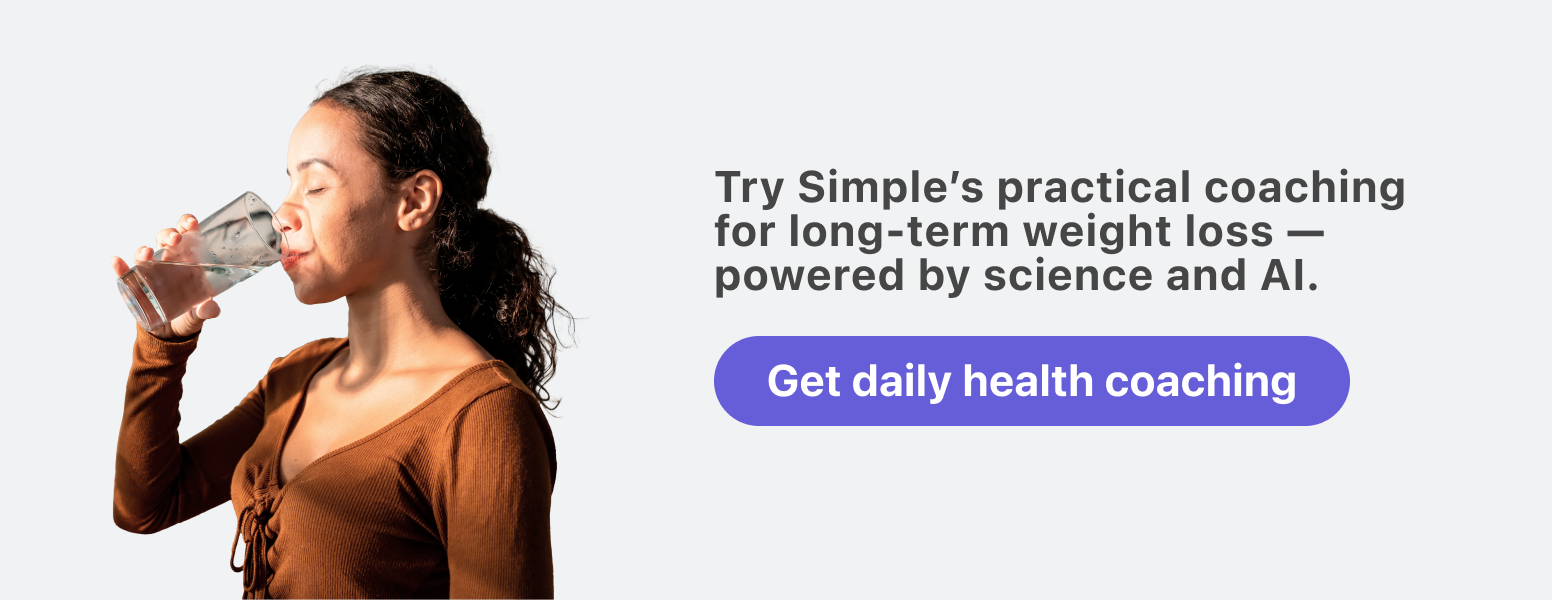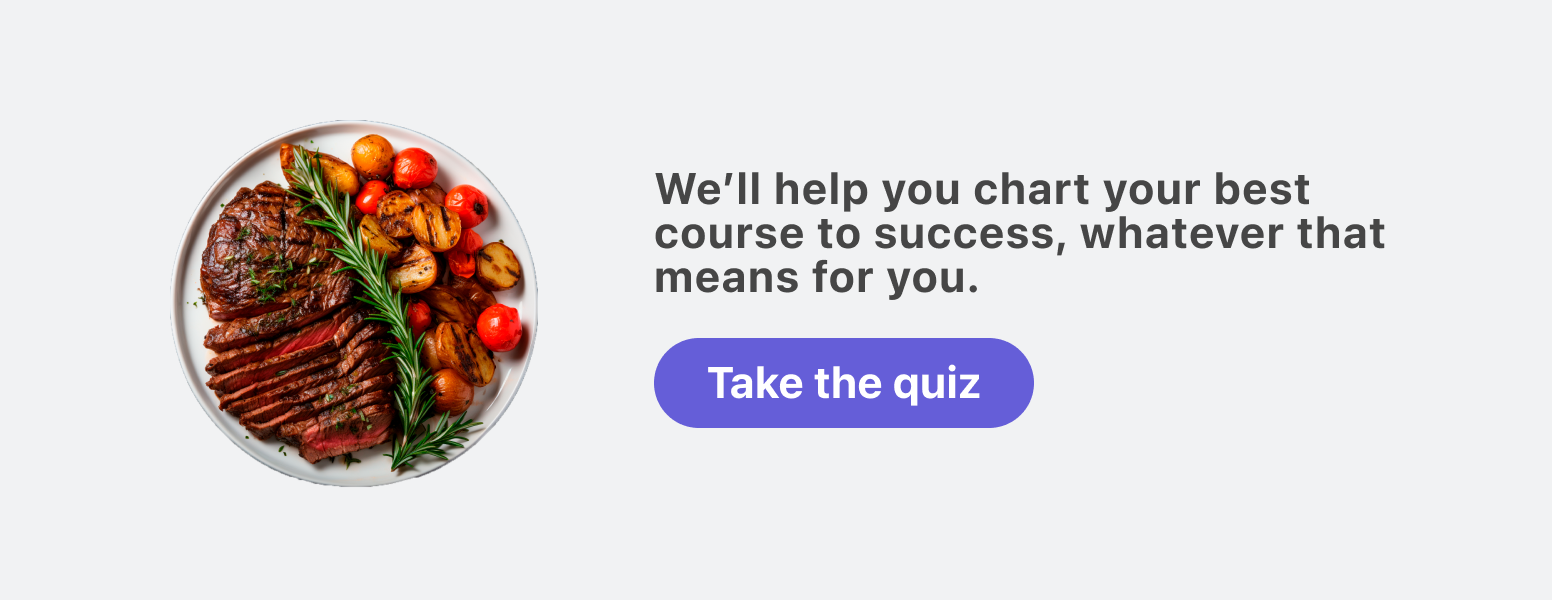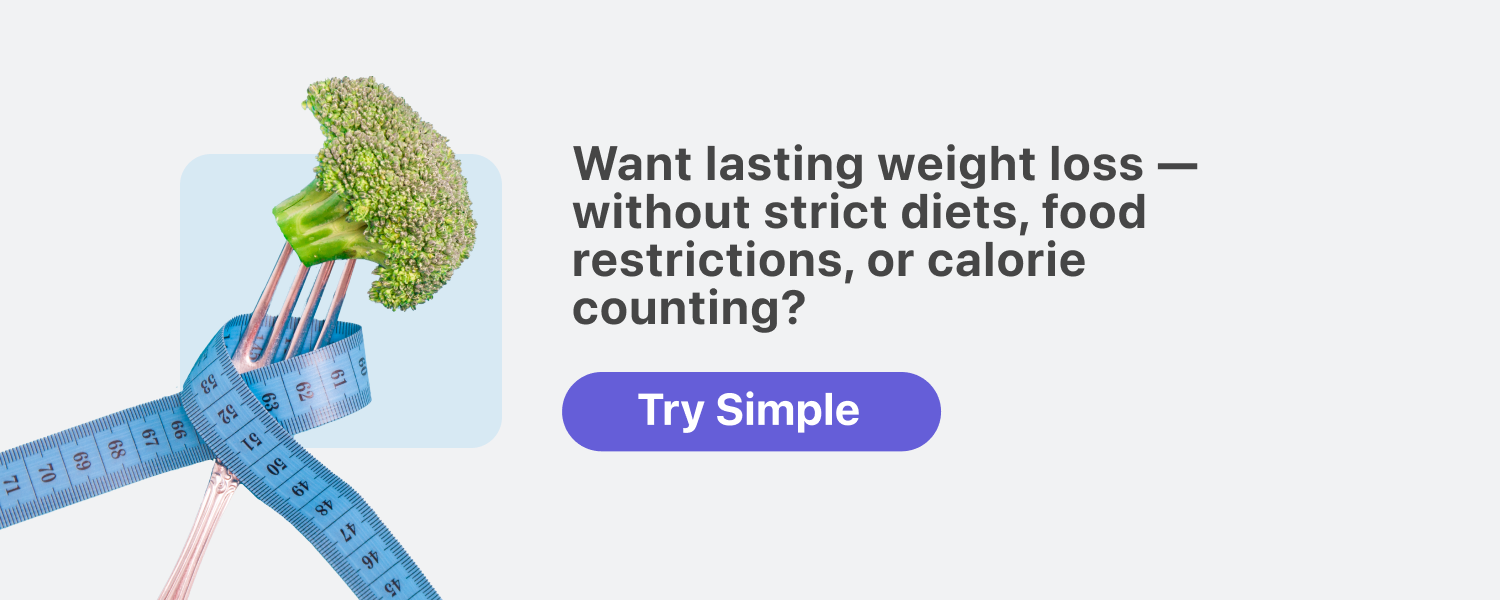Simple’s comprehensive guide to supplements for fasting

Intermittent fasting is a food routine that can unlock a range of health benefits, like improved energy levels and metabolic changes such as enhanced insulin sensitivity and improved blood lipids,[1,2,3] as well as things like weight loss and fat burning, especially in people who are overweight or living with obesity.[4,5]
However, if you’re eating less or less often, you might run into some sticking points around hitting the nutrient levels you need each day — especially if you’re focusing on less nutrient-dense food sources (like refined carbs or ultra-processed snacks like chips or pastries) or following a vegetarian or vegan intermittent fasting plan.[6]
While we recommend getting your nutrients through natural, health-promoting food sources as much as possible (like fruits, vegetables, whole grains, healthy fats, calcium-rich foods, and lean plant- and/or animal-based protein), fasting supplements may be a great ally for meeting your body’s nutritional demands if you’re coming across any obstacles with consuming a balanced diet. If you do have any concerns about not meeting nutritional requirements through what you eat alone, we suggest speaking with your healthcare provider before making any significant lifestyle changes, including taking vitamins.

But if you do end up needing to take supplements, how do you know what the best dietary supplements for fasting are or when you can take fasting vitamins to maximize their power while minimizing intermittent fasting side effects?
Let’s dig into everything you need to know about the what, when, and why of taking supplements while fasting.

Do you need intermittent fasting supplements?
While it’s unlikely you’ll run into body-fuel problems if you fill every eating window with nutrient-dense foods, nutrient deficiencies could arise in the following situations:[8]
- your pre-existing eating plan was already low in vitamins and minerals; and
- you prioritize foods high in refined carbohydrates (e.g., pastries, pizza, regular soda) or saturated / trans fats (e.g., fried foods, commercial baked goods, processed meats) over whole foods like fruits, vegetables, healthy fats (e.g., oily fish, Greek yogurt), grains (e.g., quinoa, buckwheat), and lean proteins (e.g., chicken, fish, tofu).
That’s why it’s important to discuss your eating routine with your primary care provider first, especially if you’re considering switching it up or have specific health-related goals you want to achieve. They’re best placed to help you figure out what, if any, intermittent fasting supplements you might need.
We can also be part of your support squad, especially when it comes to planning nutrient-rich meals and avoiding common intermittent fasting mistakes that may stall your progress or roadblock your well-being. Head to our Simple quiz, and we’ll help you chart your best course to success, whatever that means for you.

Will supplements break your fast?
What breaks a fast? Technically, consuming anything with calories breaks a fast.[9] That means anything you eat or drink that contains calories will stop your fast in its tracks.
But what does that mean for supplements?
Well, you do eat / drink them, but not all supplements contain calories. Sure, some can break your fast, but others can — and should, for maximum absorption — be taken on an empty stomach.
When you take a supplement should ideally be driven by what the manufacturer specifies on their instructions, but we’ve rounded up some general best practice guidelines in the next section.
When should you take your supplements?
When you consume a supplement during your eating window, it may not break your fast, but it’s still best to check out what the manufacturer has added to the party of ingredients. Plus, there are certain supplements (like fat-soluble vitamins A, D, E, and K) that make more of a splash when taken with food.[7] Others (like iron, magnesium, and B vitamins) may cause extra bumps in the road (like nausea) if they’re taken on an empty stomach.
However, everybody is different, and your body may interact with supplements differently. If you’re not sure when — and if — you should take supplements, consult your healthcare provider or dietician. They’ll be able to help you figure out what works best for your unique body.
Think of it like getting a mattress. It can be the best quality in the world, but if it doesn’t suit your body, you’re going to be stuck counting sheep all night.
If you’re feeling like you keep hitting an “intermittent fasting not working” tailspin, it may be that the timing or type of your supplement intake (or what / when you eat in general) is affecting your progress. Before raising the white flag, revisit your strategy with your healthcare provider.
Supplements to take with food during your eating window

As a general rule, you want to take any calorie-containing supplements during an eating window so they don’t break your fast. Those include:
- protein powders
- branched-chain amino acids (BCAAs)
- essential amino acids (EAAs), like l-tyrosine or creatine
- collagen
- fiber supplements
- sweetened electrolyte drink powders or effervescent tablets
- gummy vitamins or chewable supplements
- any supplements that contain sweeteners or additional ingredients, like fruit juice, cane sugar, or starches.
General multivitamin
Even if your multivitamin doesn’t contain any caloric additives, some multivitamins contain zinc, which may cause nausea if taken on an empty stomach.[10] So, you may want to take these during your eating window.
Fat-soluble vitamins (A, D, E, and K)
These four vitamins (which are helpful for your vision and bone, cell, liver, and autoimmune health [11]) are better absorbed and transported in your body when eaten with fat. So, if you choose to supplement any of these, it may be wise to take them with your meals to guarantee optimal absorption!
Magnesium
Magnesium is one of the most prevalent minerals in your body, and it’s crucial for healthy cell functioning.[12] Some people do get an upset stomach when supplementing magnesium tablets on an empty stomach, so in these instances, you may be better off taking them with food.
Zinc and copper
Zinc and copper are important minerals for regulating metabolism and supporting your immune system.[13,14] It’s important to note that taking zinc supplements may impact your body’s ability to absorb copper.[15] So, make sure to get ongoing support from your healthcare provider to manage any possible risks. Remember: to avoid an upset stomach, it may be best to have them with food.[16]
Krill oil or omega krill complex
There’s some evidence to suggest krill oil supplementation may benefit triglyceride levels and cardiovascular health.[17] However, we need larger clinical studies on humans to assess the benefits of supplementing krill oil on other cardiometabolic risk factors and outcomes. Krill oil is also absorbed better when consumed with dietary fat,[18] so if you do supplement it, it’s best to take this with a meal, too.
Omega-3 fatty acids
Omega-3s (found naturally in foods like salmon, walnuts, chia seeds, and edamame) are associated with a range of health benefits, especially heart health.[19] If you don’t consume enough oily fish (e.g., salmon or mackerel) or follow a plant-based diet, you may choose to supplement omega-3s to reach your target nutrient levels.[20]
It’s best to take omega-3 supplements with a meal that contains dietary fats (like olive oil or yogurt) to enhance absorption and minimize potential digestive comfort.[18,21]
Medium-chain triglycerides (MCTS)
Medium-chain triglycerides (found naturally in coconut oil or palm oil) are known for their ability to increase energy levels.[22] They may also support ketosis.[23] While you can take them with or without food, they are usually mixed with various foods and beverages or drizzled over meals.
Chromium
Limited studies exist to justify taking additional chromium supplements, and most of the research focuses specifically on its impact on blood glucose levels and lipid profiles in people with type 2 diabetes.[24] There is, however, some evidence that it may improve blood pressure levels,[25] but these results have only been reported for people with type 2 diabetes. Therefore, at this stage, we need more research to validate these potential benefits and determine if certain people are more likely to benefit than others.
It’s also worth mentioning that chromium supplements may interact with some medications,[26] so it’s best to check with your healthcare provider if they’re safe for you. If it is, you should always follow their instructions on when it’s best to take them.
Vanadium
Vanadium is a common supplement talked about in the diabetes world. There’s some evidence that this trace mineral may be useful in glycemic control (particularly for people with type 2 diabetes),[27] but there’s not enough data to validate this potential benefit entirely.[28] If you do choose to supplement vanadium, it’s recommended to take it during your eating window to minimize the risk of stomach discomfort.
Supplements to take while fasting

Unlike fat-soluble vitamins and supplements like krill oil or fatty acids, there are some nutrients that are better absorbed on an empty stomach, and most will not break you out of a fast. If you’re taking supplements while fasting or considering which vitamins to take while fasting, just double check that calorie content: anything below 10 kcal is probably okay.
Water-soluble vitamins (B and C)
Vitamin C and the eight vitamins that fall under the vitamin B complex umbrella are important for everything from your head to your toes. B vitamins have been linked with brain health and metabolic health [29,30] and are found naturally in a wide range of foods, from whole grains, nuts, and seeds to eggs, fish, and dairy. Some people following a more plant-based diet may find getting enough vitamin B12 harder than others.
Vitamin C is important for immune health, skin health, and disease prevention.[31,32,33] Most people don’t need additional vitamin C in supplement form if they consume fruits and vegetables daily. But if you don’t (like if you follow a keto plan or dislike these foods), you could consider it.
Unlike fat-soluble vitamins, water-soluble vitamins are absorbed better when taken on an empty stomach as they simply dissolve in water. Staying hydrated is also important, especially for these essential nutrients!
Iron
Getting the right amount of iron (Goldilocks style — not too little, but not too much) is crucial for regulating metabolic processes and blood oxygen levels.[34] Iron supplementation is generally recommended to be taken at least 30 minutes before a meal or 2 hours before taking other medications.[35] However, if you experience any side effects, have a chat with your healthcare provider, as it could be that you may benefit from taking this with a small amount of food instead. You may also wish to consider supplementing vitamin C alongside iron to help with improving its absorption.[36]
Folic acid
A folic acid supplement is usually associated with pregnancy since it supports healthy DNA replication and neural development.[37] It may also support better glycemic control and diabetes management in adults,[38] but more research is needed to explore this potential benefit further. While you can take folic acid with or without food, folate is derived from a water-soluble vitamin (B), so it’s better to have it during your fasting window with water.
Probiotics
Probiotics (live microorganisms like bacteria / yeasts) may be small, but they can pack a big health-benefiting punch when it comes to both blood sugar regulation and gut health and digestion.[39,40] Always check the label for calories and added ingredients like sugar. For some, though, it’s best to take these on an empty stomach, so they’re great to take while fasting. If you do take them in the form of yogurts or milky drinks, there will be calories in these, so it may be best to take them during your eating window.
Prebiotics
Prebiotics (basically high-fiber content food sources like onions and garlic that feed your good gut bugs) can support gut health while also benefiting your immune system and curbing your appetite.[41,42,43] Taking prebiotics supplements during your fasting window with a glass of water gives them more time to hang out in your gut, but don’t forget to check the nutrition label: some may have added ingredients, and many will contain calories that, depending on the dose you use, may or may not break your fast. Likewise, if you experience unusual changes to your bowel movements, you may want to take them with food (and consult your healthcare provider to make sure nothing underlying is going on).
Electrolytes
Natural sources of electrolytes, like Himalayan salt or coconut water, can boost hydration while also providing traces of other nutrients (minerals like potassium, iron, and zinc and vitamins like B and C) without breaking your fast, but electrolyte supplements may be particularly helpful for staying hydrated during intensive bouts of exercise.[44] Some are great to take during fasting windows since you’re extra likely to be dehydrated then, but keep in mind that some electrolyte drinks (like Liquid IV or Gatorade) may have enough calories to break your fast. Always remember our general rule: below 10 kcal is okay.
What are the best supplements for intermittent fasting?
When it comes to supplements for intermittent fasting, there’s no universal magic potion of “the best” supplements. What you take, how much you take, and how often you take them — if you take them at all — depends on your individual body, eating habits, nutritional needs, and goals for fasting. And if you consume food sources with high levels of nutrients, it’s unlikely you’ll need to supplement your eating habits at all.
If you’re concerned that your eating routine isn’t giving you all the nutritional fuel you need, or if you’re expecting to encounter any major life events, like illness or family planning, speaking with your healthcare provider is a good place to start.
What are the side effects of taking supplements while intermittent fasting?
Another reason you should always speak with your healthcare provider before making any changes to your eating routine (including modifying the what, when, and how much of any supplement you’re taking) is that some supplements can:
- interfere with existing medications (like we highlighted earlier with chromium);[45]
- be less effective depending on when you take them; and
- cause stomach cramping, nausea, diarrhea, bloating, or other digestive issues.[46]
It’s also important to remember that fasting in general should be avoided by those who:
- are pregnant or breastfeeding;
- are under the age of 18, or 80 years old or more;
- have a history of or are currently diagnosed with an eating disorder;
- are underweight (BMI below 18.5); or
- have a medical condition, like type 1 diabetes.
The advice we have provided on supplements here is also not meant to replace medical advice and isn’t intended for those mentioned in the list above.

While you can take collagen while fasting — and it may be useful for skin health [47] — many collagen supplements contain calories, so to avoid breaking your fast, you should take it during your eating window.
- Vasim I, Majeed CN, DeBoer MD. Intermittent Fasting and Metabolic Health. Nutrients [Internet]. 2022 Jan 31;14(3).
- Xie Z, Sun Y, Ye Y, Hu D, Zhang H, He Z, et al. Randomized controlled trial for time-restricted eating in healthy volunteers without obesity. Nat Commun. 2022 Feb 22;13(1):1003.
- Yuan X, Wang J, Yang S, Gao M, Cao L, Li X, et al. Effect of Intermittent Fasting Diet on Glucose and Lipid Metabolism and Insulin Resistance in Patients with Impaired Glucose and Lipid Metabolism: A Systematic Review and Meta-Analysis. Int J Endocrinol. 2022 Mar 24;2022:6999907.
- Abeyasekera KN. Benefits of Intermittent Fasting: A Systematic Review of Randomized Clinical Trials. 2020.
- Patikorn C, Roubal K, Veettil SK, Chandran V, Pham T, Lee YY, et al. Intermittent Fasting and Obesity-Related Health Outcomes: An Umbrella Review of Meta-analyses of Randomized Clinical Trials. JAMA Netw Open. 2021 Dec 1;4(12):e2139558.
- Bakaloudi DR, Halloran A, Rippin HL, Oikonomidou AC, Dardavesis TI, Williams J, et al. Intake and adequacy of the vegan diet. A systematic review of the evidence. Clin Nutr. 2021 May;40(5):3503–21.
- Tardy AL, Pouteau E, Marquez D, Yilmaz C, Scholey A. Vitamins and Minerals for Energy, Fatigue and Cognition: A Narrative Review of the Biochemical and Clinical Evidence. Nutrients [Internet]. 2020 Jan 16;12(1).
- He Z, Xu H, Li C, Yang H, Mao Y. Intermittent fasting and immunomodulatory effects: A systematic review. Front Nutr. 2023 Feb 28;10:1048230.
- Masood W, Annamaraju P, Khan Suheb MZ, Uppaluri KR. Ketogenic Diet. StatPearls Publishing; 2023.
- Li J, Cao D, Huang Y, Chen B, Chen Z, Wang R, et al. Zinc Intakes and Health Outcomes: An Umbrella Review. Front Nutr. 2022 Feb 8;9:798078.
- Youness RA, Dawoud A, ElTahtawy O, Farag MA. Fat-soluble vitamins: updated review of their role and orchestration in human nutrition throughout life cycle with sex differences. Nutr Metab. 2022 Sep 5;19(1):60.
- Beckstrand RL, Pickens JS. Beneficial Effects of Magnesium Supplementation. J Evid Based Complementary Altern Med. 2011 Oct 1;16(3):181–9.
- Kerkadi A, Alkudsi DS, Hamad S, Alkeldi HM, Salih R, Agouni A. The Association between Zinc and Copper Circulating Levels and Cardiometabolic Risk Factors in Adults: A Study of Qatar Biobank Data. Nutrients [Internet]. 2021 Aug 9;13(8).
- Gombart AF, Pierre A, Maggini S. A Review of Micronutrients and the Immune System-Working in Harmony to Reduce the Risk of Infection. Nutrients [Internet]. 2020 Jan 16;12(1).
- Duncan A, Yacoubian C, Watson N, Morrison I. The risk of copper deficiency in patients prescribed zinc supplements. J Clin Pathol. 2015 Sep;68(9):723–5.
- Osredkar J. Copper and Zinc, Biological Role and Significance of Copper/Zinc Imbalance. Journal of Clinical Toxicology [Internet]. 2011 Jan 1;s3(01).
- Ursoniu S, Sahebkar A, Serban MC, Antal D, Mikhailidis DP, Cicero A, et al. Lipid-modifying effects of krill oil in humans: systematic review and meta-analysis of randomized controlled trials. Nutr Rev. 2017 May 1;75(5):361–73.
- Maki KC, Dicklin MR. Strategies to improve bioavailability of omega-3 fatty acids from ethyl ester concentrates. Curr Opin Clin Nutr Metab Care. 2019 Mar;22(2):116–23.
- Khan SU, Lone AN, Khan MS, Virani SS, Blumenthal RS, Nasir K, et al. Effect of omega-3 fatty acids on cardiovascular outcomes: A systematic review and meta-analysis. EClinicalMedicine. 2021 Aug;38:100997.
- Plotnikoff GA, Dobberstein L, Raatz S. Nutritional Assessment of the Symptomatic Patient on a Plant-Based Diet: Seven Key Questions. Nutrients [Internet]. 2023 Mar 13;15(6).
- Omega-3 supplements: In depth [Internet]. National Center for Complementary and Integrative Health. 2018 May.
- Jadhav HB, Annapure US. Triglycerides of medium-chain fatty acids: a concise review. J Food Sci Technol. 2023 Aug;60(8):2143–52.
- Lin TY, Liu HW, Hung TM. The Ketogenic Effect of Medium-Chain Triacylglycerides. Front Nutr. 2021 Nov 18;8:747284.
- Zhao F, Pan D, Wang N, Xia H, Zhang H, Wang S, et al. Effect of Chromium Supplementation on Blood Glucose and Lipid Levels in Patients with Type 2 Diabetes Mellitus: a Systematic Review and Meta-analysis. Biol Trace Elem Res. 2022 Feb;200(2):516–25.
- Asbaghi O, Naeini F, Ashtary-Larky D, Kaviani M, Rezaei Kelishadi M, Eslampour E, et al. Effects of chromium supplementation on blood pressure, body mass index, liver function enzymes and malondialdehyde in patients with type 2 diabetes: A systematic review and dose-response meta-analysis of randomized controlled trials. Complement Ther Med. 2021 Aug;60:102755.
- Chromium [Internet]. National Institutes of Health. Office of Dietary Supplements. 2022 Jun 2.
- Ścibior A, Pietrzyk Ł, Plewa Z, Skiba A. Vanadium: Risks and possible benefits in the light of a comprehensive overview of its pharmacotoxicological mechanisms and multi-applications with a summary of further research trends. J Trace Elem Med Biol. 2020 Sep;61:126508.
- Smith DM, Pickering RM, Lewith GT. A systematic review of vanadium oral supplements for glycaemic control in type 2 diabetes mellitus. QJM. 2008 May;101(5):351–8.
- Kennedy DO. B Vitamins and the Brain: Mechanisms, Dose and Efficacy–A Review. Nutrients. 2016 Jan 27;8(2):68.
- Hanna M, Jaqua E, Nguyen V, Clay J. B Vitamins: Functions and Uses in Medicine. Perm J. 2022 Jun 29;26(2):89–97.
- Carr AC, Maggini S. Vitamin C and Immune Function. Nutrients [Internet]. 2017 Nov 3;9(11).
- Al-Niaimi F, Chiang NYZ. Topical Vitamin C and the Skin: Mechanisms of Action and Clinical Applications. J Clin Aesthet Dermatol. 2017 Jul;10(7):14–7.
- Chambial S, Dwivedi S, Shukla KK, John PJ, Sharma P. Vitamin C in disease prevention and cure: an overview. Indian J Clin Biochem. 2013 Oct;28(4):314–28.
- Abbaspour N, Hurrell R, Kelishadi R. Review on iron and its importance for human health. J Res Med Sci. 2014 Feb;19(2):164–74.
- Nguyen M, Tadi P. Iron Supplementation. StatPearls Publishing; 2023.
- Lane DJR, Jansson PJ, Richardson DR. Bonnie and Clyde: Vitamin C and iron are partners in crime in iron deficiency anaemia and its potential role in the elderly. Aging . 2016 May;8(5):1150–2.
- Greenberg JA, Bell SJ, Guan Y, Yu YH. Folic Acid supplementation and pregnancy: more than just neural tube defect prevention. Rev Obstet Gynecol. 2011 Summer;4(2):52–9.
- Asbaghi O, Ashtary-Larky D, Bagheri R, Moosavian SP, Olyaei HP, Nazarian B, et al. Folic Acid Supplementation Improves Glycemic Control for Diabetes Prevention and Management: A Systematic Review and Dose-Response Meta-Analysis of Randomized Controlled Trials. Nutrients [Internet]. 2021 Jul 9;13(7).
- Tay A, Pringle H, Penning E, Plank LD, Murphy R. PROFAST: A Randomized Trial Assessing the Effects of Intermittent Fasting and Lacticaseibacillus rhamnosus Probiotic among People with Prediabetes. Nutrients [Internet]. 2020 Nov 17;12(11).
- Bodke H, Jogdand S. Role of Probiotics in Human Health. Cureus. 2022 Nov;14(11):e31313.
- Cerdó T, García-Santos JA, G Bermúdez M, Campoy C. The Role of Probiotics and Prebiotics in the Prevention and Treatment of Obesity. Nutrients [Internet]. 2019 Mar 15;11(3).
- Davani-Davari D, Negahdaripour M, Karimzadeh I, Seifan M, Mohkam M, Masoumi SJ, et al. Prebiotics: Definition, Types, Sources, Mechanisms, and Clinical Applications. Foods [Internet]. 2019 Mar 9;8(3).
- Salleh SN, Fairus AAH, Zahary MN, Bhaskar Raj N, Mhd Jalil AM. Unravelling the Effects of Soluble Dietary Fibre Supplementation on Energy Intake and Perceived Satiety in Healthy Adults: Evidence from Systematic Review and Meta-Analysis of Randomised-Controlled Trials. Foods [Internet]. 2019 Jan 6;8(1).
- Choi DH, Cho JY, Koo JH, Kim TK. Effects of Electrolyte Supplements on Body Water Homeostasis and Exercise Performance during Exhaustive Exercise. NATO Adv Sci Inst Ser E Appl Sci. 2021 Sep 29;11(19):9093.
- Office of the Commissioner. Mixing Medications and Dietary Supplements Can Endanger Your Health [Internet]. U.S. Food and Drug Administration. FDA; 2022.
- Vogelzang JL. What you need to know about dietary supplements. Home Healthc Nurse. 2001 Jan;19(1):50–2.
- Choi FD, Sung CT, Juhasz MLW, Mesinkovsk NA. Oral Collagen Supplementation: A Systematic Review of Dermatological Applications. J Drugs Dermatol. 2019 Jan 1;18(1):9–16.
